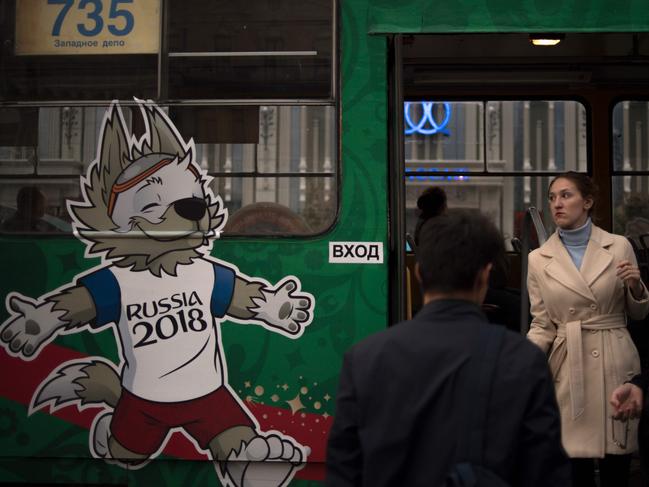Why not leave the game early and watch it on the tram?
RUSSIA has the perfect solution for commuters trying to avoid eye contact on the bus; put up big screens and broadcast the World Cup.

SA Weekend
Don't miss out on the headlines from SA Weekend. Followed categories will be added to My News.
THE old man wearing a red Egyptian top gently taps me on the back of my leg. I look around and he gently motions that I should take a step to the side. It turns out I am blocking his view of the Russia v Uruguay game.
This, however, is on a packed train, somewhere deep below the streets of Moscow. But football is football and the aged chap wants to keep an eye on the action.
You have to give the Russians a bit of credit for this one. In a bid to expose the World Cup to as many people as possible, the tournament is being shown live on the Moscow Metro, a system that carries anything up to nine million passengers a day.
Perhaps there’s a lesson there for all those state transport ministers who want to increase numbers on public transport, get the footy on. It would certainly be a win for all those Adelaide Crows supporters who like to leave at three quarter time. They could watch the rest of the game on the bus back home.
It’s an unusual experience watching a game on the train. I was at a bit of an advantage, I guess. I didn’t really have to be anywhere so I could just ride the rails in the manner of a journalistic Johnny Cash until the game was done. “I hear the train a-coming, it’s rollin’ round the bend, and I ain’t see the Socceroos win, since I don’t know when”.
But I could see the pain on the face of some folk who
had to jump off just when there was a bit of action on screen. Slow steps off the train, looks back over shoulders. You could sense the internal monologue. “I could give it one more stop, then jump back on the other train coming back.” But in Russian, obviously.
Every new face who came on the train was immediately drawn to the action on the screen. This was another benefit. The modern mode on public transport is that everyone is glued to their phones. No one was doing that on this train. Even though the home team was being smashed by the South Americans.
There are other benefits as well. Noisy things, trains. The Metro screeches and groans. It howls and it shrieks. You can’t hear the commentary. And you can’t hear the idiot in the row behind you pontificate about why the coach is a fool and the referee is a cheat.
And, unlike at a normal game, if you do end up next to the world’s worst fan, there is every chance they will get off at the next stop.
It’s cheap as well. No food, no drink to buy. With the added bonus that walking along a moving train is exactly like trying to negotiate a normal pavement after six pints at the footy.
This World Cup has restored a bit of faith in international football. In recent years, it has felt like it was losing relevance. Swamped by the enormous money in the game at club level
and by the amounts teams such as Real Madrid, Barcelona, the two Manchester outfits, PSG can spend bringing the best players together.
In that atmosphere, there is a new purity about international football. In some ways, it’s a more level playing field. A player like Portugal’s Cristiano Ronaldo now has to play with 10 blokes who wouldn’t get near a place in his Real Madrid team. He is making a better fist of it though than Lionel Messi, who has collapsed under the strain of carrying his Argentina team.
You can even see it in a complete clown like Brazil’s Neymar, who was reduced to tears after a last-gasp win against Costa Rica. You can see it in the passion of the smaller nations, the way national anthems are belted out, the noise and the commitment of the Peruvian fans, the Colombians, the Australians, the Japanese.
Or even, hundreds of feet below the streets of Moscow,
with a bunch of Russians huddled around a TV screen on a rattling train.


